模块1 Unit 1 School life reading
文档属性
| 名称 | 模块1 Unit 1 School life reading | 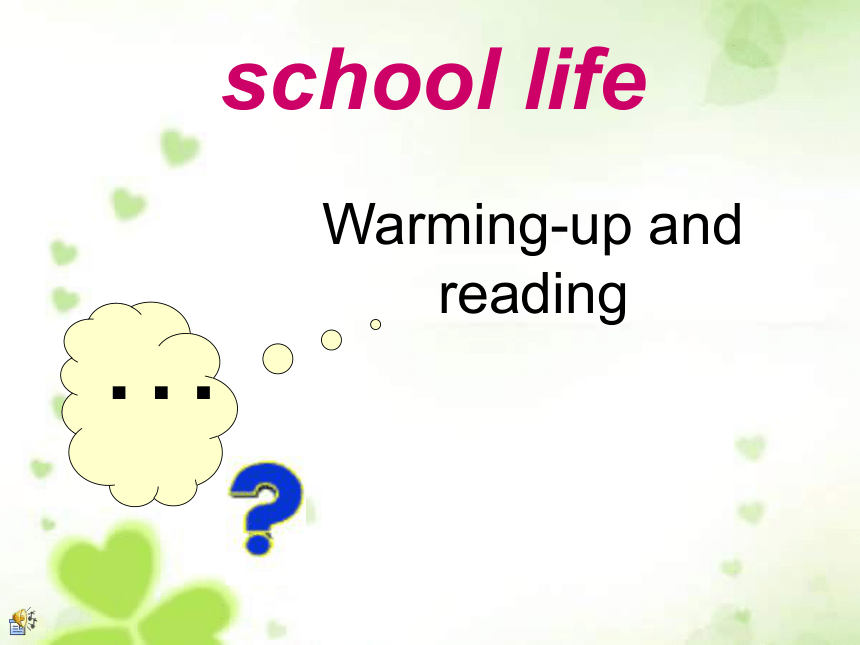 | |
| 格式 | zip | ||
| 文件大小 | 5.1MB | ||
| 资源类型 | 教案 | ||
| 版本资源 | 牛津译林版 | ||
| 科目 | 英语 | ||
| 更新时间 | 2012-10-18 11:48:42 | ||
图片预览

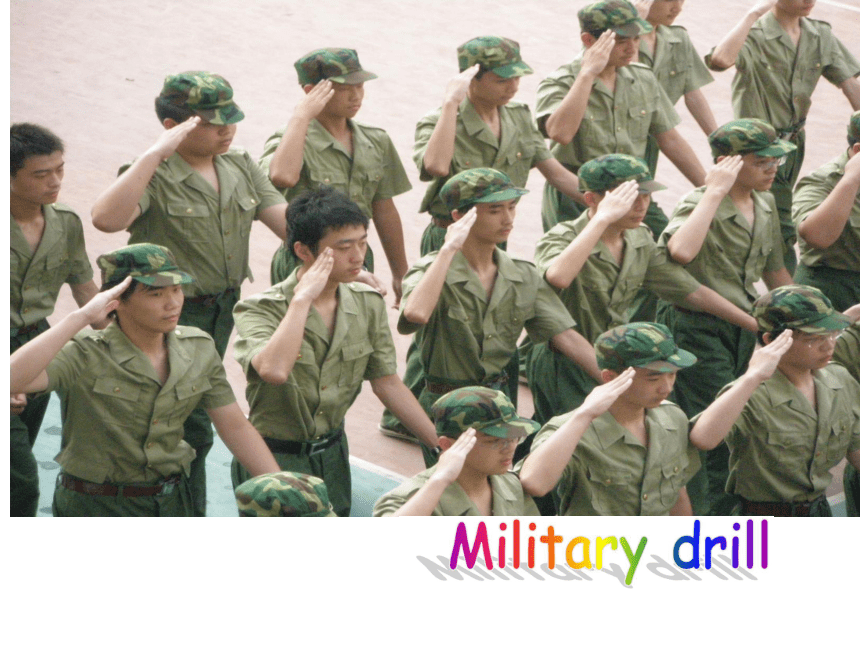
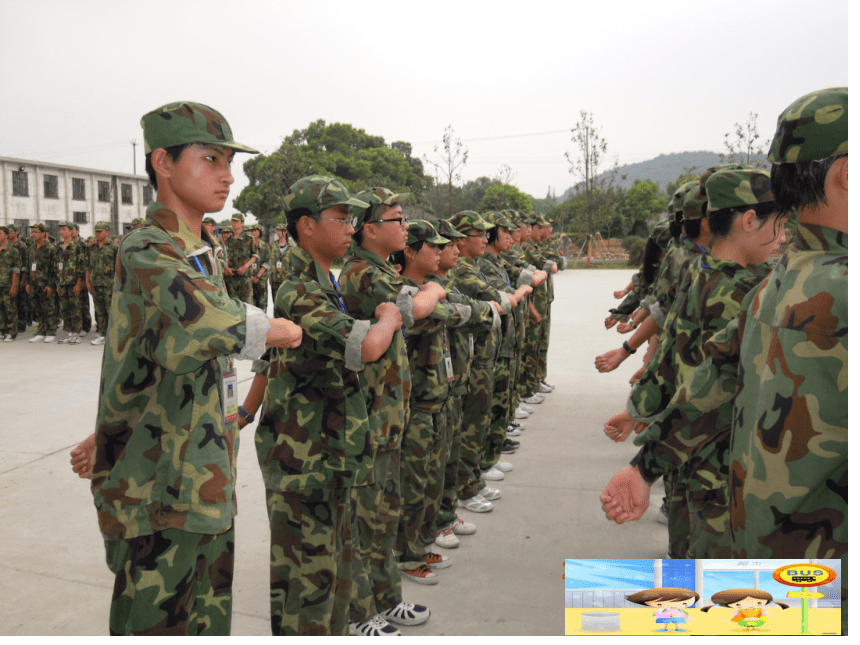
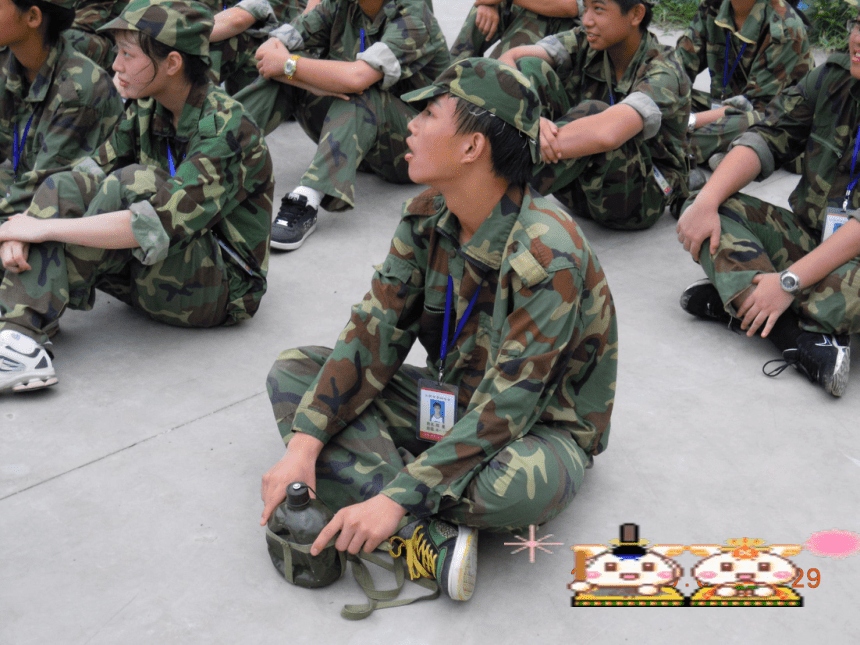
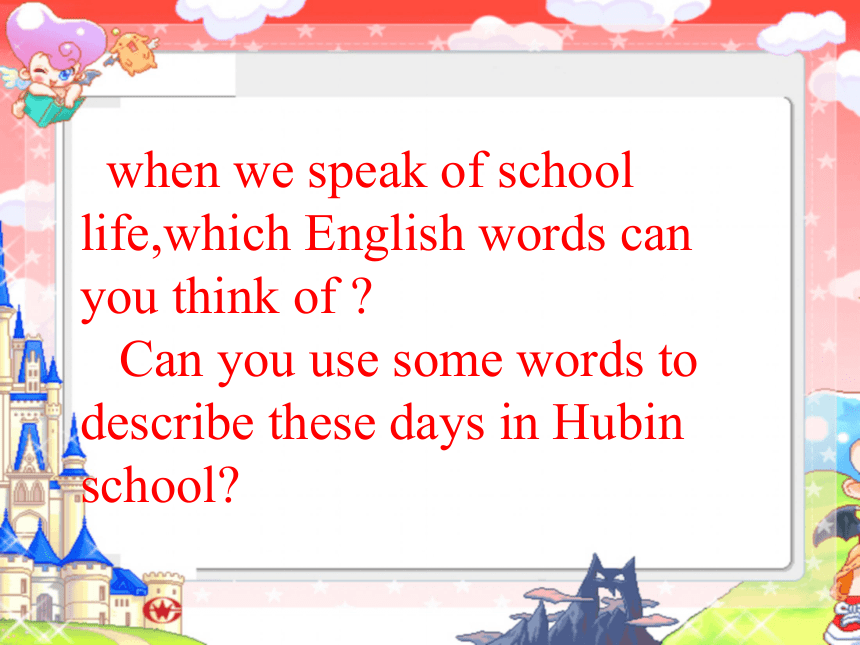






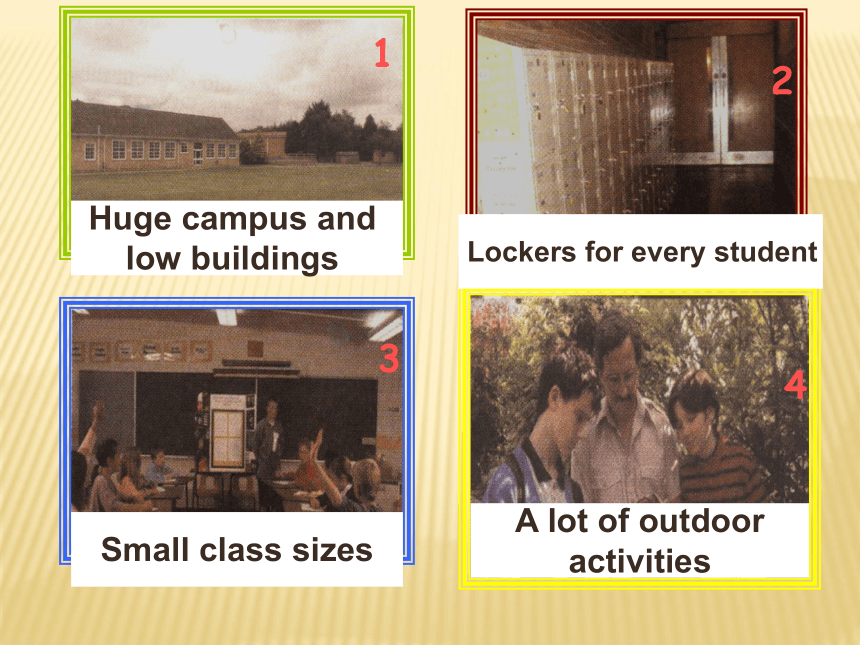
文档简介
(共75张PPT)
school life
…
Warming-up and reading
when we speak of school life,which English words can
you think of
Can you use some words to describe these days in Hubin school
excitement
challenges
discoveries
failures
successes
dreams
joys
sorrows
laughter
tears
It’s your time !
Do you want to know different school lives in different countries
上网搜索
We’ve studied English for three or
more years. What is the UK school
life like How different is it from that
in China Please look at the following pictures. They show some parts of high school in the UK. What can you see in the pictures
Huge campus and
low buildings
Lockers for every student
Small class sizes
A lot of outdoor
activities
1
2
3
4
1. What are some differences between the lives of Chinese and British high school students
in the United Kingdom
in China
Huge campus and low buildings
Large campus and taller buildings
Lockers for every student
None have such equipment.
in the United Kingdom
in China
Small class sizes
40-50-60
A lot of outdoor activities
try to achieve the balance between study and activities
3. What is your dream school life like
Teachers
Classmates
What is your dream school life like
Your dream school life
Useful expressions:
In my opinion…
I think…
The perfect school life in my mind is like this.
The teachers should be…
The students should be…
There are many activities…
…
sentence patterns
teachers
fair
patient
learned
energetic
understanding
cooperative
humorous
students
strong-willed
diligent
open-minded
energetic
competitive
cooperative
civilized
teachers
students
love
understand
respect
learn
help
appreciate
Homework
Write down your own opinion on what your dream school life is like in about 100 words.
We have learn some knowledge about the differences between Chinese school life and British school life . Do you want to know more
Lead-in:
title
Which parts of school life in the UK do you think the author will talk about in the article
略读
Reading strategy
Skimming: to get a general idea of the article.
focus on the title, heading, captions,
the first and last sentences of paragraphs,
charts and pictures …
School hours Assembly
Teachers Class size
Subjects Homework
Activities School facilities
Food Festivals
School garden
自主学习及成果展示
★
★
★
★
★
★
★
★
Skim the passage
Find out the main idea of each paragraph.
Paragraph 1 School _______________
Paragraph 2 Attending_____________
Paragraph 3 _________ and ____________
Paragraph 4-6 __________ and _________
Paragraph 7 British ____ and her_________
Paragraph 8 Her _________________
hours
assembly
teachers
classmates
homework
subjects
food
activities
intentions
1. School hours(para.1) :
2. Assembly (para.2)
3. Teachers (para.3)
4. Class size (para.3)
5. Homework (para.4)
6. Subjects (para.4.5.6)
7. Food (para. 7)
8. Activities (para.7)
Key words and phrases
1.Starts… ends… This means…
2. ①time
②The headmaster told us … He also told us that..
3. class teacher…; favourite teacher…
4. 28 students…; the average size…; different classrooms; different students…; a struggle
5. …not as heavy as…; a bit challenging… because
6. English, History,…; an extra French class; Cooking;the Art class
7. different; dessert
8. After lunch,… ; Sometimes…
Reading strategy —scanning
1. We scan the text when we want to find certain information in a text quickly.
2. key words and phrases
dates
numbers
Read the article and finish Part C1 (T or F)
1. Wei Hua’s favourite teacher was Mr.Heywood.
2. Most British classes have fewer than thirty students.
3. Wei Hua had more homework in her school in china.
4. It was very expensive for wei Hua to communicate with her parents.
5. In the UK, students can choose to stop studying any subject.
6. The cake made by Wei Hua did not taste good.
自主探究活动1
According to the headmaster, what should the students devote much time to
On average, how many students are there in a class in the UK
Why did Wei Hua find her homework difficult at first
The students should devote themselves to study.
There are 28 students in a class in the UK.
Because all the homework was in English.
(Line 10)
(Line 15)
(Line 22)
自主探究活动2
4. What subjects did Wei Hua study in the past year
5. On Tuesday, what did Wei Hua do in the evening
6. What do the British like eating at the end of dinner
She studied English, History, Maths,…etc.
She had an extra French class on Tuesday evenings.
British people like eating dessert at the end of dinner.
(Line 24)
(Line 30)
(Line 43)
Part C2:
1. According to the headmaster, what should the student spend much time on
2. Why was it a struggle for Wei Hua to remember the names of her classmates
3. Why did Wei Hua find her homework difficult at first
They should devote themselves to study.
Because there were different students
in some classes.
Because all the homework was in English.
4. Who gave Wei Hua a lot of support in her studies
5. How did Wei Hua manage to improve her English
6. What do the British like eating at the end of dinner
The teachers gave her much encouragement.
She used English every day and spent
an hour each day reading English books
in the library.
They like to eat dessert at the end of dinner.
Listen to the text to understand it further.reading.mp3
自主探究活动3
Aspects Details
General impression It was a different but exciting and enjoyable 1.______________
Assembly Students should attend it on the first day and the 2.____________
Will tell the rules of the school during that period.
Class Our class is of the 3._______ size; we would never study in a fixed classroom.
Subjects English I practiced it every day, so it got 4. ________ a lot.
French I had an 5._______ French class on Tuesday evenings.
Cooking I learned a lot and could make delicious cakes.
Selective ones Students can 6. _______ studying some subjects if they don’t like them.
7._______ It was not heavy but a bit 8.______________
Spare time I played football with others, 9._______ under a tree and went to the
Computer Club where I could send e-mails to my family and friends 10._________ of charge.
expericence
headmaster
average
improved
extra
stop
Homework
challenging
relaxed
free
Consolidation: Task-based reading
Read the text carefully and find out the similarities and differences between school life in the UK and in China.
自主探究活动4
The principal tells the students about the school rules.
Student attend the assembly on the first day.
Each teacher teaches one subject.
Students learn many kinds of subjects.
Similarities:
Differences In the UK In China
School hours
Subject
Size of the class
Food
Homework
Differences:
Suppose you have a chance to interview Wei Hua. Apart from the things you have been told, what other information would you like to know about her life and study in the UK
自我才华展示
Write one article about the similarities and differences between school life in the UK and in China.(about 100 words)
1. What is the main idea of the passage
A. Her English improved a lot as she
used English every day.
B. School life in the UK is busy and
bitter.
C. She had a wonderful experience in
a British school.
D. She was happy with the British
school hours.
2. The writer’s purpose of writing the
passage is to ______.
A. tell us that she doesn’t like school life
in Britain
B. excite more students to study abroad
C. improve her English
D. introduce her exciting and happy
school life in Britain
3. She felt lucky because _______.
A. she could get up an hour later than
usual
B. the headmaster told them to earn
respect by working hard and achieving
high grades
C. she had been given a golden
opportunity to study in Britain and
met helpful and friendly teachers
and students
D. she improved her English
4. Which of the following has the closest
meaning to “I could e-mail my family
and friends back home for free”
A. I could e-mail my family and friends
back home without paying money.
B. I could e-mail my family and friends
back home freely.
C. I could e-mail my family and friends in
my free time.
D. I could be free to e-mail my family and
friends back home.
Reading: School life in the UK
1. Going to a British high school for one year was a very
enjoyable and exciting experience for me. (page 2, lines 1—2)
a) v.ing 形式在句中作主语
eg. 1)Cooking was really very fun.
2)_________________(玩火) is dangerous.
3)_____________(抽烟) is not allowed here.
Playing with fire
Smoking
▲experience
(1)un. 经验,从经验中获得的知识和技能
(2)cn. 经历
(3)vt.体验,经历
(4)experienced adj.有经验的,经验丰富的
你教英语有很多经验。
那次车祸对他来说是一次可怕的经历。
你体验过真正饥饿的滋味吗
这种工作需要有经验的人。
You have had much experience in teaching
English.
The car accident was a terrible experience
to him.
Have you experienced real hunger
This work calls for an experienced man.
1)The _________________ mountain climber _________________a lot, and he gained much _________________ from his own adventurous _________________.
那个有经验的登山者经历了许多,他从自己的冒险经历中获得了许多经验。
experienced
experienced
experience
experiences
2)The job calls for ___ ___________ ____.这份工作需要一个有经验的人。
Please tell us your ___________ in America. 请你告诉我们你在美洲的经历。
Our English teacher has _________in
teaching.
A. many experience B. much experience
C. much experiences D. few experience
an experienced man
experiences
B
2. This means I could get up an hour later than usual as schools in China begin before 8 a.m.
(page 2, lines 4—5)
mean (meant meant)
1)mean doing sth.
If you miss this train, that will mean waiting for another 30 minutes
2)mean to do sth.
He meant to cause trouble.(他是成心惹麻烦。 )
3)I'm sorry I hurt you; I didn't mean to.
3.…as schools in China begin before 8a.m.
as可表示多种意义。
(1) 表示时间,意为“一边……一边”, “随着”。
(2) 表示原因,意为“因为”。
(3) 表示让步,意为“尽管,虽然”。
(4) 象…一样,如…一样
① When at Rome,do as the Romans do.
② 我们边走边淡。
③ 我们随着年龄的增长变得更聪明。
④ 因为明天我要走,我给你买了件礼物。
⑤ Hard as he tried,he did not pass the exam.
入乡随俗。
As we walked,we talked.
As I’m leaving tomorrow,I’ve bought you
a present.
We get wiser as we get older.
他虽然很努力,但这次考试没及格。
4. On the first day, all the students went to attend assembly.
(1) vt.出席,参加(讲座、会议、婚礼等)
(2) attend (on) sb. 照料某人,看护某人
attend to sb.
(3) attend to sth. 注意,专心干(某事)
attend on sb.
take care of
attend to sb.
The doctors are
taking care of
the sick.
The man reading the newspaper _______________(参加了会议), but he didn’t ___________ (注意听)what others were talking at all.
attended the meeting
attend to
attend, join, join in, take part in
1. He _______ the army in the year of 2003.
2. How many of you will ____________ the
coming sports meeting
3. Who is going to ____________ the concert
with me tomorrow
4. Won’t you ________ us ______ the
tennis match
joined
take part in
attend
join in
5. Devote
Devote his life to helping blind people
devote oneself to sth./doing sth.全身心做某事
be devoted to sth./ doing sth. 热爱/全心全意
6. He also told us that the best way to earn respect was to devote ourselves to study and achieve high grades.
n. 尊重,尊敬
win/earn/gain the respect of sb. 赢得某人的尊重
have a deep respect for sb. 深深敬重某人
v. 尊敬
respect sb. for doing sth. 因为……而尊敬某人
7. sound ( like ) + n./ sound + adj.
That sounds like a good idea.
8. This is about the average size for British schools. (Page 2, Line 15-16 )
1)n.
His grade is above / below average.
We receive 20 letters a day on average.
2) adj.
What is the average rainfall for July
There is nothing special about the film. It was only average.(一般)
Average students 中游的学生
9. I found the homework was not as heavy as what I used to get in my old school, but it was a bit challenging for me at first because all the homework was in English.(page 2, lines 20—22)
used to do sth
be used to do sth
be used to sth./doing sth.
I used to go to school by bike and now I am used to walking to school.
The room was used to hold meetings.
10. a bit = a little=a little bit
① a bit 和 a little 都有“一点”的意思。+adj.
例如:
He came a little / a bit late.
Can’t you walk a bit / a little faster
② a little +不可数名词
a bit of +不可数名词
例如:
Give me a bit of water, please.
Give me a little water, please.
③ not a little “不少”(=much)
not a bit “一点也不”“一点也没有”(=not at all)
试比较:
1) I am ____ tired, so I can’t go any further.
2) He is _____sad, as if it had nothing to do with him.
11. challenging adj. 有挑战性的
challenge vt. 向……挑战
challenge n. 挑战
1)I challenge you to race me across the lake.
3) She finds her new job very challenging.
4) I am looking for a job with a bit more challenge.
12. I felt lucky, as all my teachers gave me much encouragement.
(Page 2, Line 23)
1) v. encourage 支持,鼓励,刺激
encourage sb. to do sth.
反义词 discourage 使某人泄气
discourage sb. from doing sth.
2)n. Encouragement 鼓舞
3)adj. encouraging 令人鼓舞的
encouraged 受到鼓舞的
13. My English improved a lot as I used English every day and spent an hour each day reading English books in the library. (page 3, lines 26—27)
(1) 辨析:a lot, a lot of, lots of
① a lot 可以用作名词,充当宾语。
例如: We have a lot to do. 我们有很多事情要做。
② a lot 还可以用作副词,修饰动词或比较级。
作副词用时,也可作“非常”或“特别”解,用作程度状语 时,相当于 very much。例如:
She is a lot cleverer than I am.
Monkeys like bananas a lot.
③ a lot of 和 lots of + n. (多用于肯定句 )
14. Cooking was really fun as I learned how to buy, prepare and cook food.
(page 3, lines 30—31)
fun Un. “笑话”“乐趣”“有趣的事物或人”
a. 供娱乐用的
adj. funny 有趣的,滑稽的
例如:
What fun it is to go skiing on the top of the mountain.
for fun(开玩笑地,为了乐趣)
have fun(玩得愉快)
make fun of(嘲笑,取笑)
15.
v.
prepare “使...做好准备”;
prepare for 为...而准备
be (well) prepared for/ to do sth
已为...做好了准备
Prepare a meal for sb.
=prepare sb. a meal
n.
Make preparations for…
16. I missed Chinese food a lot at lunch time.
miss v. 思念, 想念; 错过, 躲过;
未击中,未达到(目标)
missing adj. 丢失的,不在的,失踪的
17. Fond (page 3, line 34)
be fond of …
Noun. Fondness
18. Relax (page 3, line 46)
Sit down and relax!
The music will help to relax you.
Noun. relaxation
Adj. relaxed/relaxing
19. Look back on (page 3, line 47-48)
As I look back upon/on those years,I felt life was so happy. 回顾,回想
20. Satisfy (page 3, line 48)
be satisfied with sth.
Satisfy my curiosity
n. with my satisfaction
Homework
1. Do a reading exercise.
2. Finish the exercises in students’ workbook
3. Write down your own school life in Guanghua. Then send it to your pen-friends.
school life
…
Warming-up and reading
when we speak of school life,which English words can
you think of
Can you use some words to describe these days in Hubin school
excitement
challenges
discoveries
failures
successes
dreams
joys
sorrows
laughter
tears
It’s your time !
Do you want to know different school lives in different countries
上网搜索
We’ve studied English for three or
more years. What is the UK school
life like How different is it from that
in China Please look at the following pictures. They show some parts of high school in the UK. What can you see in the pictures
Huge campus and
low buildings
Lockers for every student
Small class sizes
A lot of outdoor
activities
1
2
3
4
1. What are some differences between the lives of Chinese and British high school students
in the United Kingdom
in China
Huge campus and low buildings
Large campus and taller buildings
Lockers for every student
None have such equipment.
in the United Kingdom
in China
Small class sizes
40-50-60
A lot of outdoor activities
try to achieve the balance between study and activities
3. What is your dream school life like
Teachers
Classmates
What is your dream school life like
Your dream school life
Useful expressions:
In my opinion…
I think…
The perfect school life in my mind is like this.
The teachers should be…
The students should be…
There are many activities…
…
sentence patterns
teachers
fair
patient
learned
energetic
understanding
cooperative
humorous
students
strong-willed
diligent
open-minded
energetic
competitive
cooperative
civilized
teachers
students
love
understand
respect
learn
help
appreciate
Homework
Write down your own opinion on what your dream school life is like in about 100 words.
We have learn some knowledge about the differences between Chinese school life and British school life . Do you want to know more
Lead-in:
title
Which parts of school life in the UK do you think the author will talk about in the article
略读
Reading strategy
Skimming: to get a general idea of the article.
focus on the title, heading, captions,
the first and last sentences of paragraphs,
charts and pictures …
School hours Assembly
Teachers Class size
Subjects Homework
Activities School facilities
Food Festivals
School garden
自主学习及成果展示
★
★
★
★
★
★
★
★
Skim the passage
Find out the main idea of each paragraph.
Paragraph 1 School _______________
Paragraph 2 Attending_____________
Paragraph 3 _________ and ____________
Paragraph 4-6 __________ and _________
Paragraph 7 British ____ and her_________
Paragraph 8 Her _________________
hours
assembly
teachers
classmates
homework
subjects
food
activities
intentions
1. School hours(para.1) :
2. Assembly (para.2)
3. Teachers (para.3)
4. Class size (para.3)
5. Homework (para.4)
6. Subjects (para.4.5.6)
7. Food (para. 7)
8. Activities (para.7)
Key words and phrases
1.Starts… ends… This means…
2. ①time
②The headmaster told us … He also told us that..
3. class teacher…; favourite teacher…
4. 28 students…; the average size…; different classrooms; different students…; a struggle
5. …not as heavy as…; a bit challenging… because
6. English, History,…; an extra French class; Cooking;the Art class
7. different; dessert
8. After lunch,… ; Sometimes…
Reading strategy —scanning
1. We scan the text when we want to find certain information in a text quickly.
2. key words and phrases
dates
numbers
Read the article and finish Part C1 (T or F)
1. Wei Hua’s favourite teacher was Mr.Heywood.
2. Most British classes have fewer than thirty students.
3. Wei Hua had more homework in her school in china.
4. It was very expensive for wei Hua to communicate with her parents.
5. In the UK, students can choose to stop studying any subject.
6. The cake made by Wei Hua did not taste good.
自主探究活动1
According to the headmaster, what should the students devote much time to
On average, how many students are there in a class in the UK
Why did Wei Hua find her homework difficult at first
The students should devote themselves to study.
There are 28 students in a class in the UK.
Because all the homework was in English.
(Line 10)
(Line 15)
(Line 22)
自主探究活动2
4. What subjects did Wei Hua study in the past year
5. On Tuesday, what did Wei Hua do in the evening
6. What do the British like eating at the end of dinner
She studied English, History, Maths,…etc.
She had an extra French class on Tuesday evenings.
British people like eating dessert at the end of dinner.
(Line 24)
(Line 30)
(Line 43)
Part C2:
1. According to the headmaster, what should the student spend much time on
2. Why was it a struggle for Wei Hua to remember the names of her classmates
3. Why did Wei Hua find her homework difficult at first
They should devote themselves to study.
Because there were different students
in some classes.
Because all the homework was in English.
4. Who gave Wei Hua a lot of support in her studies
5. How did Wei Hua manage to improve her English
6. What do the British like eating at the end of dinner
The teachers gave her much encouragement.
She used English every day and spent
an hour each day reading English books
in the library.
They like to eat dessert at the end of dinner.
Listen to the text to understand it further.reading.mp3
自主探究活动3
Aspects Details
General impression It was a different but exciting and enjoyable 1.______________
Assembly Students should attend it on the first day and the 2.____________
Will tell the rules of the school during that period.
Class Our class is of the 3._______ size; we would never study in a fixed classroom.
Subjects English I practiced it every day, so it got 4. ________ a lot.
French I had an 5._______ French class on Tuesday evenings.
Cooking I learned a lot and could make delicious cakes.
Selective ones Students can 6. _______ studying some subjects if they don’t like them.
7._______ It was not heavy but a bit 8.______________
Spare time I played football with others, 9._______ under a tree and went to the
Computer Club where I could send e-mails to my family and friends 10._________ of charge.
expericence
headmaster
average
improved
extra
stop
Homework
challenging
relaxed
free
Consolidation: Task-based reading
Read the text carefully and find out the similarities and differences between school life in the UK and in China.
自主探究活动4
The principal tells the students about the school rules.
Student attend the assembly on the first day.
Each teacher teaches one subject.
Students learn many kinds of subjects.
Similarities:
Differences In the UK In China
School hours
Subject
Size of the class
Food
Homework
Differences:
Suppose you have a chance to interview Wei Hua. Apart from the things you have been told, what other information would you like to know about her life and study in the UK
自我才华展示
Write one article about the similarities and differences between school life in the UK and in China.(about 100 words)
1. What is the main idea of the passage
A. Her English improved a lot as she
used English every day.
B. School life in the UK is busy and
bitter.
C. She had a wonderful experience in
a British school.
D. She was happy with the British
school hours.
2. The writer’s purpose of writing the
passage is to ______.
A. tell us that she doesn’t like school life
in Britain
B. excite more students to study abroad
C. improve her English
D. introduce her exciting and happy
school life in Britain
3. She felt lucky because _______.
A. she could get up an hour later than
usual
B. the headmaster told them to earn
respect by working hard and achieving
high grades
C. she had been given a golden
opportunity to study in Britain and
met helpful and friendly teachers
and students
D. she improved her English
4. Which of the following has the closest
meaning to “I could e-mail my family
and friends back home for free”
A. I could e-mail my family and friends
back home without paying money.
B. I could e-mail my family and friends
back home freely.
C. I could e-mail my family and friends in
my free time.
D. I could be free to e-mail my family and
friends back home.
Reading: School life in the UK
1. Going to a British high school for one year was a very
enjoyable and exciting experience for me. (page 2, lines 1—2)
a) v.ing 形式在句中作主语
eg. 1)Cooking was really very fun.
2)_________________(玩火) is dangerous.
3)_____________(抽烟) is not allowed here.
Playing with fire
Smoking
▲experience
(1)un. 经验,从经验中获得的知识和技能
(2)cn. 经历
(3)vt.体验,经历
(4)experienced adj.有经验的,经验丰富的
你教英语有很多经验。
那次车祸对他来说是一次可怕的经历。
你体验过真正饥饿的滋味吗
这种工作需要有经验的人。
You have had much experience in teaching
English.
The car accident was a terrible experience
to him.
Have you experienced real hunger
This work calls for an experienced man.
1)The _________________ mountain climber _________________a lot, and he gained much _________________ from his own adventurous _________________.
那个有经验的登山者经历了许多,他从自己的冒险经历中获得了许多经验。
experienced
experienced
experience
experiences
2)The job calls for ___ ___________ ____.这份工作需要一个有经验的人。
Please tell us your ___________ in America. 请你告诉我们你在美洲的经历。
Our English teacher has _________in
teaching.
A. many experience B. much experience
C. much experiences D. few experience
an experienced man
experiences
B
2. This means I could get up an hour later than usual as schools in China begin before 8 a.m.
(page 2, lines 4—5)
mean (meant meant)
1)mean doing sth.
If you miss this train, that will mean waiting for another 30 minutes
2)mean to do sth.
He meant to cause trouble.(他是成心惹麻烦。 )
3)I'm sorry I hurt you; I didn't mean to.
3.…as schools in China begin before 8a.m.
as可表示多种意义。
(1) 表示时间,意为“一边……一边”, “随着”。
(2) 表示原因,意为“因为”。
(3) 表示让步,意为“尽管,虽然”。
(4) 象…一样,如…一样
① When at Rome,do as the Romans do.
② 我们边走边淡。
③ 我们随着年龄的增长变得更聪明。
④ 因为明天我要走,我给你买了件礼物。
⑤ Hard as he tried,he did not pass the exam.
入乡随俗。
As we walked,we talked.
As I’m leaving tomorrow,I’ve bought you
a present.
We get wiser as we get older.
他虽然很努力,但这次考试没及格。
4. On the first day, all the students went to attend assembly.
(1) vt.出席,参加(讲座、会议、婚礼等)
(2) attend (on) sb. 照料某人,看护某人
attend to sb.
(3) attend to sth. 注意,专心干(某事)
attend on sb.
take care of
attend to sb.
The doctors are
taking care of
the sick.
The man reading the newspaper _______________(参加了会议), but he didn’t ___________ (注意听)what others were talking at all.
attended the meeting
attend to
attend, join, join in, take part in
1. He _______ the army in the year of 2003.
2. How many of you will ____________ the
coming sports meeting
3. Who is going to ____________ the concert
with me tomorrow
4. Won’t you ________ us ______ the
tennis match
joined
take part in
attend
join in
5. Devote
Devote his life to helping blind people
devote oneself to sth./doing sth.全身心做某事
be devoted to sth./ doing sth. 热爱/全心全意
6. He also told us that the best way to earn respect was to devote ourselves to study and achieve high grades.
n. 尊重,尊敬
win/earn/gain the respect of sb. 赢得某人的尊重
have a deep respect for sb. 深深敬重某人
v. 尊敬
respect sb. for doing sth. 因为……而尊敬某人
7. sound ( like ) + n./ sound + adj.
That sounds like a good idea.
8. This is about the average size for British schools. (Page 2, Line 15-16 )
1)n.
His grade is above / below average.
We receive 20 letters a day on average.
2) adj.
What is the average rainfall for July
There is nothing special about the film. It was only average.(一般)
Average students 中游的学生
9. I found the homework was not as heavy as what I used to get in my old school, but it was a bit challenging for me at first because all the homework was in English.(page 2, lines 20—22)
used to do sth
be used to do sth
be used to sth./doing sth.
I used to go to school by bike and now I am used to walking to school.
The room was used to hold meetings.
10. a bit = a little=a little bit
① a bit 和 a little 都有“一点”的意思。+adj.
例如:
He came a little / a bit late.
Can’t you walk a bit / a little faster
② a little +不可数名词
a bit of +不可数名词
例如:
Give me a bit of water, please.
Give me a little water, please.
③ not a little “不少”(=much)
not a bit “一点也不”“一点也没有”(=not at all)
试比较:
1) I am ____ tired, so I can’t go any further.
2) He is _____sad, as if it had nothing to do with him.
11. challenging adj. 有挑战性的
challenge vt. 向……挑战
challenge n. 挑战
1)I challenge you to race me across the lake.
3) She finds her new job very challenging.
4) I am looking for a job with a bit more challenge.
12. I felt lucky, as all my teachers gave me much encouragement.
(Page 2, Line 23)
1) v. encourage 支持,鼓励,刺激
encourage sb. to do sth.
反义词 discourage 使某人泄气
discourage sb. from doing sth.
2)n. Encouragement 鼓舞
3)adj. encouraging 令人鼓舞的
encouraged 受到鼓舞的
13. My English improved a lot as I used English every day and spent an hour each day reading English books in the library. (page 3, lines 26—27)
(1) 辨析:a lot, a lot of, lots of
① a lot 可以用作名词,充当宾语。
例如: We have a lot to do. 我们有很多事情要做。
② a lot 还可以用作副词,修饰动词或比较级。
作副词用时,也可作“非常”或“特别”解,用作程度状语 时,相当于 very much。例如:
She is a lot cleverer than I am.
Monkeys like bananas a lot.
③ a lot of 和 lots of + n. (多用于肯定句 )
14. Cooking was really fun as I learned how to buy, prepare and cook food.
(page 3, lines 30—31)
fun Un. “笑话”“乐趣”“有趣的事物或人”
a. 供娱乐用的
adj. funny 有趣的,滑稽的
例如:
What fun it is to go skiing on the top of the mountain.
for fun(开玩笑地,为了乐趣)
have fun(玩得愉快)
make fun of(嘲笑,取笑)
15.
v.
prepare “使...做好准备”;
prepare for 为...而准备
be (well) prepared for/ to do sth
已为...做好了准备
Prepare a meal for sb.
=prepare sb. a meal
n.
Make preparations for…
16. I missed Chinese food a lot at lunch time.
miss v. 思念, 想念; 错过, 躲过;
未击中,未达到(目标)
missing adj. 丢失的,不在的,失踪的
17. Fond (page 3, line 34)
be fond of …
Noun. Fondness
18. Relax (page 3, line 46)
Sit down and relax!
The music will help to relax you.
Noun. relaxation
Adj. relaxed/relaxing
19. Look back on (page 3, line 47-48)
As I look back upon/on those years,I felt life was so happy. 回顾,回想
20. Satisfy (page 3, line 48)
be satisfied with sth.
Satisfy my curiosity
n. with my satisfaction
Homework
1. Do a reading exercise.
2. Finish the exercises in students’ workbook
3. Write down your own school life in Guanghua. Then send it to your pen-friends.
